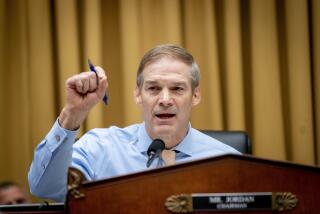Whitewater’s Powerful Undertow : The Damage of Damage Control
- Share via
WASHINGTON — Around Washington last week, political types have two major reactions to the continuing Whitewater uproar. Some people express highly vocal astonishment at how the still- unknown, probably-not-so-big Whitewater offenses have acquired all the trappings of a major scandal. Other folks are just tickled at the Clintons’ troubles and opine righteously about the First Couple’s arrogance of power.
Neither school seems to see that a big part of Whitewater’s fascination is its role as a mirror to the bitter politics of the past 25 years.
Clinton defenders are surely right about one thing: The underlying offenses now laid at the door of the Clintons, especially of Hillary Rodham Clinton, are sins often committed in state politics with only minor comment. Money may have moved illegally between Bill Clinton’s Arkansas campaign funds and the Whitewater Development Corp.--but so far we’ve heard no evidence that the Clintons knowingly violated the law. It may also be that indebtedness to Clinton swayed an Arkansas banking regulator’s decision about whether to sanction the practices of Madison Guaranty Savings & Loan, but such crimes are notoriously hard to prove.
True, it was not just these allegations that made Whitewater fester and spread. There was also what is now known as the “cover-up.” The Clinton Administration has behaved almost inexplicably in reacting to this scandal.
Recently ousted White House Counsel Bernard W. Nussbaum and Hillary Rodham Clinton both worked for the House Judiciary Committee during Watergate in a successful attempt to bring down President Richard M. Nixon. In other words, they helped create the climate of pervasive political mistrust without which Whitewater, at least in its current bloated form, could not happen. No wonder people are asking how these same two people could be so blind to the moral and practical dangers of stonewalling?
But the puzzle is broader than that. In the time since Watergate, we have seen scandal after scandal follow the same pattern: exposure of wrongdoing, cover-up, exposure of cover-up, conflagration. In other words, we have had 20 years of training in the difference between successful and self-destructive damage control. Where were the Clintonites while all this was going on?
Yet, the facts are unmistakable: In the wake of Vincent W. Foster Jr.’s suicide, some of the Clintons’ papers were removed from his office and sent to their outside personal lawyer rather than remaining available to federal investigators. The First Couple strenuously resisted giving the Justice Department documents in their control. Other documents were shredded by Hillary Clinton’s old law firm. White House aides met with regulators to discuss an investigation in which the Clintons were involved.
So what is going on here? Well, one factor at work is that the Clinton White House has been operating with an insufficient amount of adult supervision.
The tales of White House staff behavior are numerous and consistent: Meetings called on the spur of the moment. Often anyone can walk into a meeting and ask a question. Whenever crisis strikes, everyone drops what he or she is doing and races in that direction. As one Administration official described, “They’re like little kids just learning soccer. They don’t know how to play their positions: When the ball moves, the whole team just follows it.”
From time to time, an outsider, like David R. Gergen or Lloyd N. Cutler, is brought in as savior and legitimizer. But the White House insiders resist acculturation. Thus, it is no surprise that some of the Whitewater mess is due, just as Administration spokespeople have said, to dumb mistakes.
Next, Hillary Clinton is right to charge that partisanship is at work here. She blames it on Republicans and others who have political or financial reasons for opposing her husband’s programs, but here she is off the mark. The passionate rage with which the opposition party and its writers pursue the Clintons comes from 20 years of being told by Democrats that Republicans and people who like the private sector are slimeballs.
In the years after Watergate, many of the Clintons’ comrades, who were not known as notable sticklers for the rules, used the issue of ethics as a tool against Republicans and conservatives. The ethics enthusiasts encouraged journalists in the habit of thinking of scandal as the center of political news.
Now the press is hooked, with an addict’s craving for scandal politics. Republicans have come into possession of a satisfying fix. To ask them now to stop in their tracks, assume the mantle of statesmen, and proclaim this an occasion for both parties to kick the scandal habit is useless and perhaps even counterproductive: The current scandal-mongering will probably not stop until both parties have had their noses rubbed in it.
Yet, perhaps the strongest subterranean stream feeding this scandal is ambivalence about the First Lady. This resentment is somewhat unexpected. Hillary Clinton is admired by many for embodying the idea of the new, more assertive woman who shares in her husband’s career without sacrificing her own individual work, interests and open access to political power.
Some people doubtless hate her for precisely this reason: She is a woman exercising unprecedented female political authority. Others probably dislike her certitude--men because they think it pushy, women because it refuses to acknowledge the tensions and ambivalence of their own lives as workers, wives and mothers.
Most important, Hillary Clinton has run afoul of the deep American animus toward nepotism. We hate the practice because it announces that power will be distributed not according to rules by which all can compete but within unbreachable walls of blood and kinship. Also, it enables some people in power to escape the normal channels of accountability. Mrs. Clinton has so far not been forced to give direct answers to questions about Whitewater. Each public appearance she makes, answering only what she chooses to answer, delivers the reminder that some politicians under scandal fire are more equal than others.
Whitewater shows us a scandal machine--built of multiple rules and the large-scale urge to exploit them--that is expert in magnifying public figures’ sins. It also shows us that some of the designers of this machine did not take it seriously either as a threat or as a guide to their own conduct.
The scandal displays a generation, finally come to power in the White House, seemingly incapable of the self-discipline necessary to build an organization that might present a reasoned response to a crisis like Whitewater. Finally, it reveals a First Lady who does not understand that she must sometimes be governed by the rules and attitudes that constrain more ordinary politicians.
We have seen the 1960s all grown up, and the sight makes a depressing prediction about the course of the Whitewater scandal and the future of the Clinton Administration from here on in.
More to Read
Get the L.A. Times Politics newsletter
Deeply reported insights into legislation, politics and policy from Sacramento, Washington and beyond. In your inbox twice per week.
You may occasionally receive promotional content from the Los Angeles Times.










